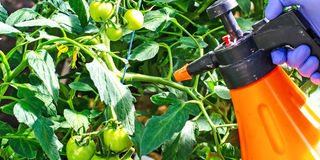Toxic tomatoes now on your plate

Kirinyaga is the leading producer of tomatoes in Kenya and farmers heavily rely on pesticides to control pests and diseases.
What you need to know:
- Farmers are harvesting tomatoes before the pesticides used during production have cleared
- Out of 20 pesticides mainly applied in open field farms, 16 were applied at significantly higher rates
- WHO says coming into contact with large amounts of pesticides could affect reproduction and potentially cause cancer
Kenyans could be eating pesticides in their meals every day, a study has shown.
The study has revealed that Kenyans are consuming tomatoes contaminated with toxic pesticides, which sticks on the tomatoes even after washing them, the effect is more dangerous on those consuming them raw.
Tomatoes are the most consumed and are considered very profitable vegetables in Kenya. People use tomatoes daily to make food tastier and healthier not knowing that some of them can be a source of diseases.
According to the study by Kenyatta University researchers, farmers are harvesting tomatoes before the pesticides used during production have cleared.
Harvest prematurely
The research, Farmers’ Compliance to Pesticide Use standards in Mwea Irrigation Scheme, Kirinyaga County, revealed that farmers routinely overuse pesticides and harvest the vegetables prematurely before chemicals decay. This is against manufacturers’ instructions.
Kirinyaga is the leading producer of tomatoes in Kenya and farmers heavily rely on pesticides to control pests and diseases. Annually, the county produces 1,500 tonnes of tomatoes.
The results revealed that out of 20 pesticides mainly applied in open field farms, 16 were applied at significantly higher rates. Tomatoes sprayed with 19 of the pesticides were harvested at significantly shorter pre-harvest intervals than recommended by the manufacturers.
For the 12 pesticides applied in greenhouses, three were applied at significantly higher rates and tomatoes sprayed with two types of pesticides were harvested at shorter duration than specified by the manufacturers.
The study, published in the International Journal of Innovative Research and Advanced Studies, also revealed that coragen, duduthrin, bestox and belt were some of the insecticides applied at higher rates.
The study, that interviewed 203 farmers (198 from open field and five from greenhouse farms) who grow tomatoes and use pesticides consistently for at least two years, also showed that harvesting of tomatoes earlier than the specified time was a common practice by both.
“Harvesting the tomatoes earlier than the specified withholding period has been attributed to the detection of pesticide residue levels in tomatoes from production to the consumer, which is a health risk to the consumer especially when consumed daily,” states the study.
Cause cancer
The World Health Organization (WHO) says coming into contact with large amounts of pesticides could affect reproduction and potentially cause cancer.
The international health agency says there is not much research regarding the possible long-term health risks of pesticide exposure.
However, pesticides are typically more toxic to humans than herbicides. Exposure to large quantities of a pesticide may cause mild, moderate and severe poisoning.
The study, co-authored by Momanyi Violet and Dr Peterson Warutere from KU’s department of environmental and occupational health, shows the farmers mostly use WHO class II pesticides, which are toxic and whose residues are likely to remain in the crop when used inappropriately.
The study recommends frequent education and training for farmers by the Ministry of Agriculture on safe use of pesticides to help improve compliance to use standards and also to quantify the severity within the farm.
This way, the farmers will be able to decide on which control measures to take when the thresholds of the pest or disease are still low, adds the study.
From the findings, Information obtained from the farmers indicated that most (58 per cent) of the growers in Mwea Irrigation Scheme had not received any training on safe use of pesticides, which may have contributed to non-compliance to standards.
Ten of these pesticides were applied by farmers who had been trained while 30 of them were applied by those who had not been trained. “Non-compliance was due to ignorance, intentional and reliance on neighbour’s and their own information,” the study states.
“Training on the safe use of pesticides is important as it gives the pesticide users knowledge on appropriate and effective use when controlling specific pests and diseases. Untrained farmers are likely to ignore the manufacturers’ instructions on the pesticide label,” states the study.


